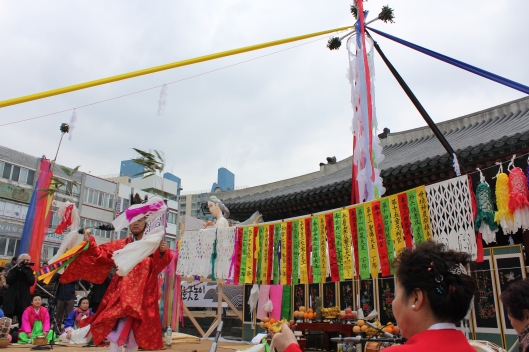In the dead of winter, take heart: spring is not far away.
Ipchun, one of 24 seasonal divisions by the lunisolar calendar, marks the onset of spring. On Jeju, people traditionally celebrated it primarily by affixing a handwritten poster, ‘Ipchun-daegil’, to the main gate of the house to wish that the day bring great luck.
Historic record establishes that Ipchun Gut [shamanistic ritual] was held on the day to ask the gods for both wellbeing of the people and prosperity of the island for the year. This tradition died out in 1925 during Japanese occupation period; however, it was revived in 1999 with the inception of the Tamnaguk Ipchun Gutnori festival, now an annual event.
Ipchun falls on February 4th. Certainly, Jeju is not the only place to traditionally celebrate this first day of spring; In China it is known as ‘Da chun’, the name originating from an act in which people whip an earthen ox figure on the day, observed on February 5th.
It is an important occasion for the Chinese based on the traditional agricultural society as spring signifies the beginning of the farming season. Japanese also celebrate ‘Setsubun’ at this time, in which people throw roasted beans in and outside of the house to cast evil away and to welcome good luck.
Although the way people celebrate is different, Ipchun Gut of Jeju shares meaning with the celebrations of China and Japan.
Ipchun Gut at Tamnaguk Ipchun Gutnori festival is prepared by the preservation committee of Jeju Chilmeoridang Yeongdeung Gut and led by shaman Yunsoo Kim, designated by the government as an ‘intangible heritage holder’. As several ritual features of the Gut are similar to those shamanic rituals held in village shrines, it provides a good opportunity to witness Jeju Gut. The festival lasts two days: a Confucian ritual called ‘Nangsha Kosa’ opens Day One and is followed by the procession; along with Ipchun Gut, programs of Day Two consist of traditional plays and a variety of performances.
This year, the festival is held February 3-4, 2012. (Photo: Ipchun Gut at Tamnaguk Ipchun Gutnori, 2012.)

Dr. Anne Hilty is a Cultural Health Psychologist with a focus on the interplay of Eastern and Western theories of mental health as well as the mind-body connection. Her grounding is in the fields of cultural, transpersonal, and health psychology; she is additionally influenced by classical Chinese medicine, somatic psychology, and Asian shamanic traditions. Originally from the city of New York, Dr. Hilty lives on bucolic Jeju Island in South Korea, having previously lived in Seoul and Hong Kong.









